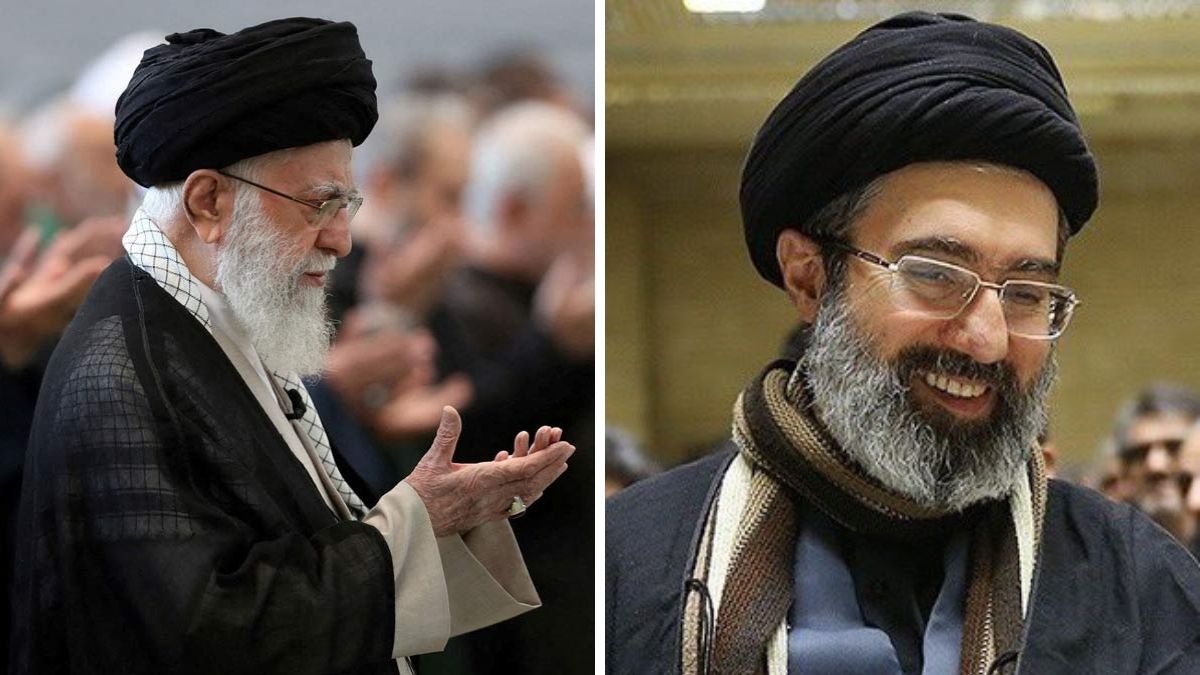Israel didn't target Iran's Supreme Leader Khamenei for a reason. It involves his son Mojtaba: Analyst
 Iran Supreme Leader Ali Khamenei. (Right) His son and successor Mojtaba Khamenei | X
Iran Supreme Leader Ali Khamenei. (Right) His son and successor Mojtaba Khamenei | X
Israel began its military campaign against Iran in the early hours of Friday by decimating its top leadership, including Maj. Gen. Mohammad Bagheri, the chief of staff of Iran’s armed forces, five other senior IRGC commanders and a top nuclear negotiator.
While it was precision strikes that took out the decision makers - Israeli missiles and drones targeted them at their homes - it tactically avoided Iran's Supreme Leader Ali Khamenei.
Though Israeli senior military leaders said Khamenei was 'not off limits' for Israel, but it "depends on many things", omitting Khamenei from the list is not entirely inexplicable. Israel chose to do so to avoid legitimising his son, Mojtaba Khamenei, the Supreme Leader’s son and behind-the-scenes enforcer, according to Carlo J.V. Caro, a foreign policy and military expert.
Caro, in an article that appeared on US-based The Hill argues that martyring the Supreme Leader "would have produced explosive consequences far beyond the battlefield" as Shi’a political theology is structured around martyrdom.
Also read: Iran has secretly elected its next Supreme Leader as Khamenei plans to abdicate: Report
Iran's Constitution stipulates that upon the death of the Supreme Leader, the Assembly of Experts should initiate an emergency succession process. Caro argues that Khamenei's successor would likely be Mojtaba.
However, Mojtaba, who reportedly was being groomed for the post and is now an active presence in government circles, lacks the "religious credentials" necessary for the role. "He has never issued a formal legal opinion, never taught in the traditional seminaries of Qom or Najaf and has never been accepted as a senior clerical authority. In Shi’a Islam, legitimacy must be earned through decades of scholarship and peer recognition — it is not inherited as with a monarchy," Caro claimed in the article.
The analyst added that killing Khamenei would give legitimacy to Mojtaba, enabling his rise. Otherwise, his ascent to the post would remain a matter of controversy. "As long as the Ayatollah lives to a ripe old age, Mojtaba is both too illegitimate to unify the system and too protected to be sidelined. Thus, he may stall Iran’s succession process into a doctrinal stalemate — one that Israel has now made more likely by weakening his military protectors while leaving his father alive," Caro states.
Israel's killing of Khamenei would turn the event into a "mythology", like a reenactment of the Karbala tragedy - a pivotal event in Islamic history wherein family members of Imam Husayn ibn Ali, the grandson of Prophet Muhammad, were defeated by Umayyad Caliph Yazid I. Shia Muslims considers this event a symbol of sacrifice, justice, and resistance against tyranny.
In such an event, his son Mojtaba would be sanctified, which would help him unify Iran’s factions, and legitimise violent escalation from Iran’s regional proxies.
Besides, the assassination of Khamenei would trigger the Iranian proxies, which include Hezbollah and Houthis, to a "full-spectrum retaliation" that involves missile barrages and cyberattacks. "Sparing Khamenei denies Iran that trigger," Caro argues.
The analyst says Israel's taking out of the Islamic Revolutionary Guard Corps (IRGC) senior command has its benefits as they were the ones that deterred rebellion "reinforced Mojtaba’s authority, and insulated the clerical apparatus from challenge". Killing the senior command broke the regime's protective outer layer, leaving them exposed to rebellion and transnational rivals.
Middle East